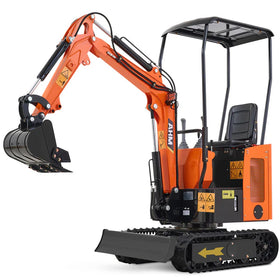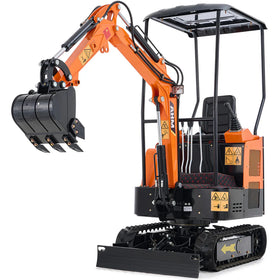Soil is said to be "hard" when it is dense and compact in nature. If you are working on a construction project, gardening, or setting foundations on hard soil, you may need more than just a shovel and some elbow grease. That's where a mini excavator comes in.A mini-excavator makes all forms of digging easy and effective. In this guide, we’ll look at digging a hole in hard soil with a mini excavator, hoping you can complete your digging job quickly and safely.

Why Use a Mini Excavator to Dig a Hole in Hard Soil?
Tackling hard soil with a mini excavator is always a wise and effective decision. Mini excavators provide the following abilities:
1. Power and Efficiency: Mini excavators have robust hydraulic systems that can provide huge digging power. This means they can easily penetrate tough soils that would be nearly impossible to dig through with just a shovel.
2. Precision and Control: With the well-coordinated movements of the bucket or auger, mini excavators can provide excellent control over the excavation process. This helps make sure that holes are dug efficiently with clean sides and flat bottoms.
3. Safety and Comfort: The covered cab of the excavator shields the operator from the weather and flying debris, lowering the possibility of injury. The ergonomic design and user-friendly controls also make long hours of operation more comfortable.
How to Dig a Hole in Hard Soil: The Preparing Process
Proper preparation is key to successful excavation, especially when dealing with hard soil. Here’s how to get ready:
1. Safety Checks: It's important to first make sure the site is safe before digging. This involves marking any underground utilities to avoid damaging them. You can also use caution tape or safety markers to help prevent accidents.
2. Site assessment: Take the time to evaluate the soil consistency, vegetation coverage, and ground density. Look for hidden obstacles like large rocks or roots, which could affect the digging process. Furthermore, make sure there is a clear path leading to the site. If the space is tight, you might need to grade the ground or lay down boards to create a stable path for the mini excavator.
3. Choosing the Ideal Attachment: Depending on the nature of the hole you intend to dig, selecting the right attachment can greatly enhance efficiency. For instance:
- An auger is ideal for creating deep and narrow holes. It is suitable for posts or foundations.
- A hydraulic breaker might be necessary to get through rockier and more challenging sections.
- A bucket attachment is versatile for general excavation and can be used to clear debris.

How to Dig a Hole in Hard Soil: The Digging Process
A proper technique is needed when using a mini excavator to dig in hard soil. Here are some tips to ensure an effective process:
1. Initial Positioning: Start by placing your mini excavator a safe distance away from the excavation site. Make sure the site is visible, and the machine is stable. Use markers or have a helper guide you to align perfectly with the spot.
2. Starting the Excavation: Lower the bucket and make light penetrations to test the soil. The objective is to assess the stability of soil and determine the necessary adjustments to be made for proper digging. For example, maintain a cautious and steady approach to avoid cave-ins for sandy soil, which is loose and prone to collapse. For clay-based soil, your mini excavator may need more force at first and should advance steadily. Once you've become accustomed to the settings, place the bucket blades at the center of the site. Apply consistent downward pressure to break through the soil slowly. Rotate the bucket to gather loose material until it is filled for the initial scoop.
3. Deepening the Hole: After you've made the initial penetration, it is time to concentrate on deepening the hole. Use the bucket to lift the soil efficiently but make sure not to disturb the stability of the surrounding earth.
4. Completing the Digging: Once you've reached the desired depth, use the bucket to smoothen the bottom of the hole and refine its edges. This last adjustment can help to make the hole's measurements match the requirements of your project.

Why Choose 13.5HP Mini Excavator B&S Engine with 6 Attachments?
With the Briggs & Stratton engine, the 13.5HP Briggs & Stratton mini excavator can dig effectively, even in tough soil. Its design can keep it from getting too hot, and its lifespan triples compared with the Briggs & Stratton's CR Series. It also comes with a two-year guarantee. With its six adaptable attachments, including a narrow bucket, an auger head, a hammer, a rake, a log grapple, and a quick hitch, this compact excavator can do a lot of different jobs, such as digging in hard soil, drilling, demolition, and so on.

In summary, when it comes to how to dig a hole in hard soil, a mini excavator is the ideal tool for efficiency, accuracy, and safety. The 13.5HP mini excavator with a B&S Engine and six attachments is a great choice for you to dig effectively. Are you ready to enjoy the best digging performance? Find out more about our mini excavators in AHM now!







